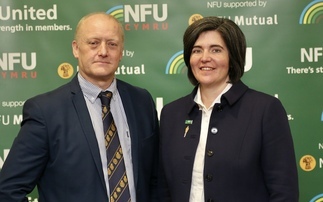
Red Tractor has come under fire after a new environmental module has been confirmed with little scrutiny or consultation.
The 'Greener Farms Commitment' (GFC) module is expected to come into force in April 2024.
See more: Red Tractor 'crossed the red line' on environment module introduction
Red Tractor's said the module was a 'voluntary' add on which will operate very differently from its typical core standards and enable farmers to track development in five key areas: Carbon foot printing; Soil management; Nutrient management; Waste management; and Biodiversity.
Red Tractor
But many in the industry questioned the use of the term voluntary and the inevitability of it quickly becoming a necessity.
It said the GFC would not require the same thing at every farm, but instead required farmers to register a plan for progress, measure their success and then learn against that.
In response, NFU Deputy President Tom Bradshaw said: "The NFU has long supported Red Tractor Assurance as vital to allow our members to compete in the marketplaces in which they operate.
"Nonetheless, for the past 18 months we have been robustly challenging the governance behind the development of this environment module.
"I was alarmed that it had been previously decided by the Red Tractor board that in developing this module all of the technical committees and sector boards where NFU members sit would be bypassed.
"I have found this position completely unacceptable and said so repeatedly. We have never said that as one of the 18 members of the Red Tractor board we didn't have knowledge of the module, but at no point have expert NFU members and advisors been involved with the development of the crucial details within it.
"Consequently, at the final Red Tractor board meeting where this was agreed in September, I again argued for greater oversight, and significant concessions were gained by the NFU to allow the module to be scrutinised by the technical advisory committees of all farming sectors and the sector boards.
NFU deputy president
"We also fought for and gained agreement to set up a Development Advisory Panel to further scrutinise development of the greener farms work. At the same time, we highlighted significant concerns about how this could work in the devolved nations with their differing agricultural policies. They have not been involved at all.
"With these concessions won we felt that the board could approve the position, sending it out for this wider scrutiny.
"The surprising British Retail Consortium (BRC) statement on the Greener Farms commitment has made many question the validity of the process agreed above.
"As it stands, there has been no clear vision delivered as to how this is going to add any value to farm gate and yet it will help retailers deliver more of their ESG requirements, which ultimately brings value.
"I, more than anyone, want British farming to stand up to the challenges of imports from around the world; to demonstrate the sustainability credentials of British farming and to drive solutions to the environmental challenges we face.
"This module could provide some of the solutions if deployed in the correct sectors and with minimal cost burden, and after the proper scrutiny that was agreed. Ultimately however, the additional cost cannot be shouldered by our farmer members and the supply chain will have to pay a premium for the associated increase in costs."

























